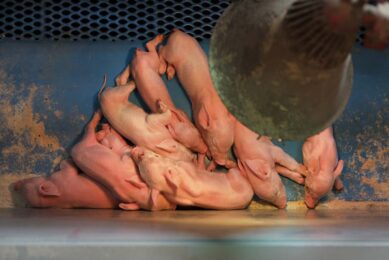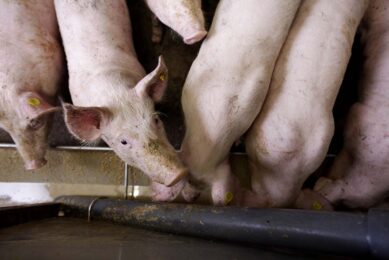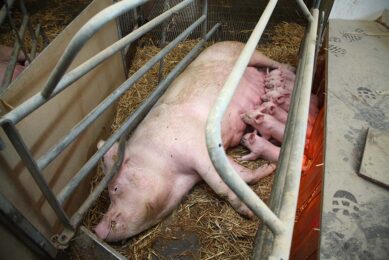Boosting weaned piglets with algae

Weaning is one of the most sensitive periods within pig production systems. Piglets at this age encounter simultaneously several stressors and they are not fully developed immunologically. Macroalgal polysaccharides can support immune and gut barrier functions during this moment of risk known as the ‘immunity gap’.
Weaning is a multi-factorial stressful period that results in a low feed intake. This reduction in feed consumption will have a direct impact on the structure; and the digestive and absorptive activities of the intestinal mucosa. These altered digestive activities can ultimately disrupt intestinal barrier function; thus weaning is associated with increased gut permeability, mucosal inflammation and diarrhoea. Antibiotics and high dosing of zinc oxide have played a major role in promoting weaned pig health and performance over the last decades. However, the usage of antimicrobials in pigs contributes to a reservoir of drug-resistant bacteria capable of transferring anti-microbial resistance to pathogenic bacteria in both animals and humans. Consequently, many countries worldwide have banned or are implementing new regulations aiming at the ban of the inclusion of antibiotics and high dosing of zinc oxide in weaning diets. This trend has urged an intensive research effort to identify alternative bioactive molecules that are able to promote weaned piglets gut health and growth performance.
Most of the alternatives rely on different mechanisms aiming at the same goal: preventing intestinal dysbiosis, by modulating and/or stabilising microbiota in the gut. The modulation of the animal’s immune function and reinforcement of the intestinal barrier function are other strategies leading to a higher resilience degree of animals against external aggressors. Recent research has pointed out the potential of in-feed marine macroalgal polysaccharides as reliable agents for immune activation and gut integrity promotion in weaned piglets.
Figure 1 – MSP structure.
Macroalgal extracts specificity
Parietal polysaccharides of seaweeds present a structural complexity and unique composition that make them very reactive and explain their biological activities towards animals. The complexity and reactivity of seaweed polysaccharides derive from the nature of the sugar units, which are diverse and sometimes rare, like uronic acids, xylose and rhamnose; the variety of glycosidic bonds leading to their branched structure, and the presence of sulphate groups. Furthermore, their polyanionic structure and solubility increase their reactivity and facilitate their recognition by host cells. Sulphated polysaccharides are characteristic of macroalgae (they are not found in terrestrial plants, nor fresh water microalgae or yeast cell walls).
Olmix Group, France, has been studying marine biotechnologies for more than 20 years and has focused on the extraction and use of specific macroalgal polysaccharides to support immune and gut barrier functions. Olmix Group marine bioactive ingredient extraction know-how has led to the development of an in-feed product, Algimun, which is based on the combination of two biologically active macroalgal extracts: MSP Barrier, a red algal extract, which enhances the barrier function of the intestinal mucosa; and MSP Immunity, a green algal extract that reinforces innate and adaptive immune responses. Olmix Group conducted a set of experiments in collaboration with Intestinal Biotech Development (France, 2017) in order to assess the effect of MSP Barrier on the intestinal barrier function using in vitro models, mucus-secreting HT-29 MTX cells for evaluation of the effects on mucins and enterocyte-like Caco-2 cells for the evaluation of the effects on tight junction proteins.
Results showed that the product upregulates the gene expression of scaffolding proteins and transmembrane proteins which are essential for optimal functioning of the tight junctions. In addition, it upregulates the expression of mucin targeted genes that have crucial roles in the regulation of epithelial cell differentiation (membrane-bound), the establishment of the mucus layer (gel-forming) and the prevention of pathogen colonisation. MSP Barrier plays an important role in the maintenance of gut mucosa integrity which is the first line of defence against pathogens and toxins by rendering the tight junctions stronger and a more functional mucus layer.
A research project in collaboration with INRA, France, led to the demonstration of the effect of MSP Immunity on immune mediators’ transcription in porcine in vitro models (IPEC-1 cell line), including the identification of the metabolic pathways involved in this activation. Berri et al. (2016) first highlighted that the product could influence the gene transcription of a broad array of immune mediators (cytokines and chemokines) involved in defence mechanisms within the innate and the adaptive immune response, among others, the recruitment and activation of antigen-presenting cells, such as dendritic cells and macrophages, the differentiation and proliferation of different populations of lymphocytes, both B and T, while inducing immune tolerance thanks to its anti-inflammatory properties.
Figure 2 – Veterinary treatments (%).
Effect of Algimun in piglets
The benefits of Algimun supplementation in pre-starter and starter feed were evaluated on health parameters and growth performance in a commercial trial conducted in France. Piglets from gilts were divided into control group (without supplementation) and test group (supplemented with Algimun at an inclusion rate of 2kg/ton of feed in the pre-starter period (from day 21 until day 35) and 1.5 kg/ton of feed in the starter period (from day 35 until day 64) respectively. The number and body weight of piglets at weaning was homogenised by treatment. Samples of blood were collected to analyse haptoglobin levels at day 26, haptoglobin being an acute-phase protein the level of which increases in case of inflammation. The results showed that the supplemented pigs presented lower inflammatory status when compared to the control group (-16% haptoglobin level) and a significantly lower number of animals needing a veterinary treatment (57%, P<0.01) (>Figure 2).
Figure 3 – Body weight (kg), day 64.
Supplemented pigs also showed improved performance (+300g at 64 days) (Figure 3) with high profitability: ROI = 3:1. Algimun algal bioactive compounds reinforce the intestinal barrier function and boost the animal’s immune responses. In short, it can be used as a natural alternative in-feed compound that is able to promote health and performance of pigs in the nursery phase and it can play an important role within the reduction of antibiotics and high dosing zinc oxide use in farms.
References available on request
Author: María García Suárez, For Feed Product Specialist, Olmix Group
 Beheer
Beheer








 WP Admin
WP Admin  Bewerk bericht
Bewerk bericht